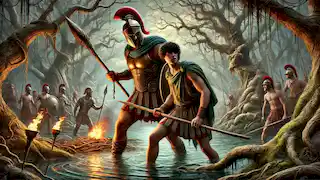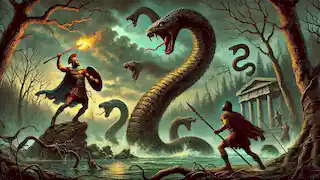In the cradle of civilization, where the whispers of the gods carried across the Aegean Sea and myth intertwined with reality, there lay a tale of heroism and monstrosity—a story forged in the heart of ancient Greece. This was the legend of the Hydra of Lerna, a creature whose name inspired dread across the land. It was not merely a tale of battle but a chronicle of courage, wit, and the indomitable spirit of a hero destined for greatness. The village of Lerna, nestled near the lush Argolid plains, had once been a beacon of prosperity. Its fertile lands yielded golden wheat and its pristine waters supported flourishing vineyards. However, all changed when the Hydra—a monstrous serpent born of Typhon and Echidna—claimed the nearby swamp as its lair. The swamp, once teeming with life, decayed under the Hydra's presence. Crops failed, the livestock died from drinking poisoned water, and the skies above darkened as if the sun itself turned away in fear. Villagers spoke in hushed tones of the beast, describing its many heads that writhed like a nest of vipers, its breath so toxic it scorched the earth. Those brave or foolish enough to challenge the creature never returned. To the people of Lerna, it was not just a monster but a punishment sent by Hera herself. The goddess, angered by her husband's infidelity with Alcmene, sought to torment Heracles, Alcmene’s son and the child of Zeus. Prayers to the gods went unanswered, and as despair gripped the hearts of the villagers, the shadow of the Hydra grew ever larger. Rumors of the Hydra's terror reached King Eurystheus of Mycenae. Though the monster ravaged a neighboring land, he saw an opportunity to solidify his dominance and to test the mettle of Heracles, the son of Zeus, whose strength was unmatched among mortals. Heracles, burdened by guilt for the crimes Hera had driven him to commit, sought redemption through the Twelve Labors assigned by Eurystheus. Slaying the Hydra became his second labor, a task deemed impossible by the king and the gods alike. The hero prepared meticulously for the challenge. Knowing brute force alone would not be enough, Heracles consulted the Oracle of Delphi. The cryptic words of the Pythia warned him, "The Hydra grows not alone; severance is not its end. Wisdom must temper your strength, for fire will cleanse what blades cannot." Armed with this insight, Heracles forged his weapons: an indestructible club carved from a sacred olive tree and a golden sword gifted by the goddess Athena. Accompanied by his nephew and faithful companion, Iolaus, Heracles journeyed to the cursed swamps of Lerna. As they neared the swamp, the air grew heavy and fetid, filled with the stench of rot and decay. Trees, once verdant and thriving, stood twisted and blackened, their roots strangled by the tainted waters. Frogs and insects, the usual symphony of a wetland, were conspicuously absent. Only silence and the occasional guttural hiss of the Hydra broke the oppressive stillness. Heracles and Iolaus prepared for battle. Heracles gripped his club, its weight a comforting reminder of his strength, while Iolaus carried a bundle of pitch-soaked torches. They knew that facing the Hydra required both brawn and cunning, for the beast was no ordinary foe. Suddenly, the earth trembled beneath their feet, and ripples spread across the stagnant pools. The Hydra emerged from its lair, a monstrous sight that sent chills even through Heracles' iron will. Nine heads writhed atop long, sinewy necks, each head snapping and hissing like a serpent enraged. Its scales shimmered darkly, impenetrable as the finest armor, and its eyes glowed with an unholy fire. Heracles wasted no time. With a roar, he charged the beast, his club raised high. The first blow landed with a thunderous crack, shattering one of the Hydra's heads. Venom sprayed from the severed neck, sizzling as it struck the ground. But before Heracles could savor his victory, two new heads sprouted from the wound, their hisses more ferocious than the last. The Hydra counterattacked, its heads darting like striking vipers. Heracles dodged with agility, his muscles straining as he deflected the blows. Each head seemed to possess its own mind, coordinating with the others to ensnare him. Despite his immense strength, Heracles found himself outmatched. Watching from a distance, Iolaus saw his uncle faltering. Inspiration struck as he remembered the Oracle’s words. Grabbing a torch, he set it aflame and rushed to Heracles' side. Heracles struck again, severing another head with his sword. This time, Iolaus acted swiftly, pressing the torch to the bleeding stump. The flame cauterized the wound, preventing new heads from growing. The Hydra recoiled, its screams echoing across the swamp. The two worked in perfect harmony. Heracles focused on severing the heads, each swing of his club precise and powerful. Iolaus followed with fire, sealing the wounds before the Hydra could regenerate. Slowly but surely, they gained the upper hand. The battle was far from over. The Hydra's venomous breath filled the air, forcing Heracles to hold his breath as he fought. Its tails lashed out, knocking him off balance, while its remaining heads snapped at Iolaus, who narrowly avoided their fangs. Despite the odds, their strategy held, and the Hydra began to weaken. From her throne on Mount Olympus, Hera watched the battle unfold. Furious at Heracles' success, she decided to intervene. Summoning a giant crab, she sent it to the swamp to aid the Hydra. The creature emerged from the muck, its pincers snapping menacingly. The crab attacked Heracles, clamping onto his leg with its powerful claws. Pain seared through him, but Heracles refused to yield. Swinging his club, he crushed the crab with a single blow, its shell shattering like glass. Hera's intervention had failed. Realizing the Hydra’s defeat was inevitable, Hera retreated, leaving the hero to finish his labor. {{{_03}}} The battle reached its climax as Heracles faced the Hydra's central head—the immortal one, impervious to any weapon. He struck at its neck repeatedly, but the head would not yield. Heracles, remembering Athena's wisdom, devised a plan. Using all his strength, he pinned the head beneath his foot while Iolaus brought a massive boulder from the swamp's edge. Together, they buried the immortal head beneath the stone, trapping it for eternity. The Hydra's body collapsed, its remaining heads lifeless and still. The swamp fell silent once more. {{{_04}}} Heracles returned to King Eurystheus, carrying a vial of the Hydra’s venom as proof of his victory. The venom, potent beyond measure, would later become both a weapon and a curse in Heracles’ life. Eurystheus, shocked by Heracles’ success, plotted even more dangerous labors to test the hero’s resolve. The villagers of Lerna celebrated their deliverance. The swamp, once a place of death and despair, began to heal. Birds returned to the skies, and the land flourished once more. The tale of the Hydra became a cornerstone of Greek mythology, a testament to the strength, ingenuity, and perseverance of Heracles. It reminded mortals and gods alike that even the greatest challenges could be overcome with determination and wit.A Land Cursed
The Summoning of Heracles
The Approach to the Swamp

The First Clash
Fire Against the Hydra

Hera’s Interference
The Immortal Head
Triumph and Legacy
The Legend of the Hydra
Reading Time: 7 min

About Story: The Legend of the Hydra is a Myth Stories from greece set in the Ancient Stories. This Dramatic Stories tale explores themes of Courage Stories and is suitable for All Ages Stories. It offers Cultural Stories insights. A heroic tale of courage, strategy, and divine intervention in ancient Greece.


















